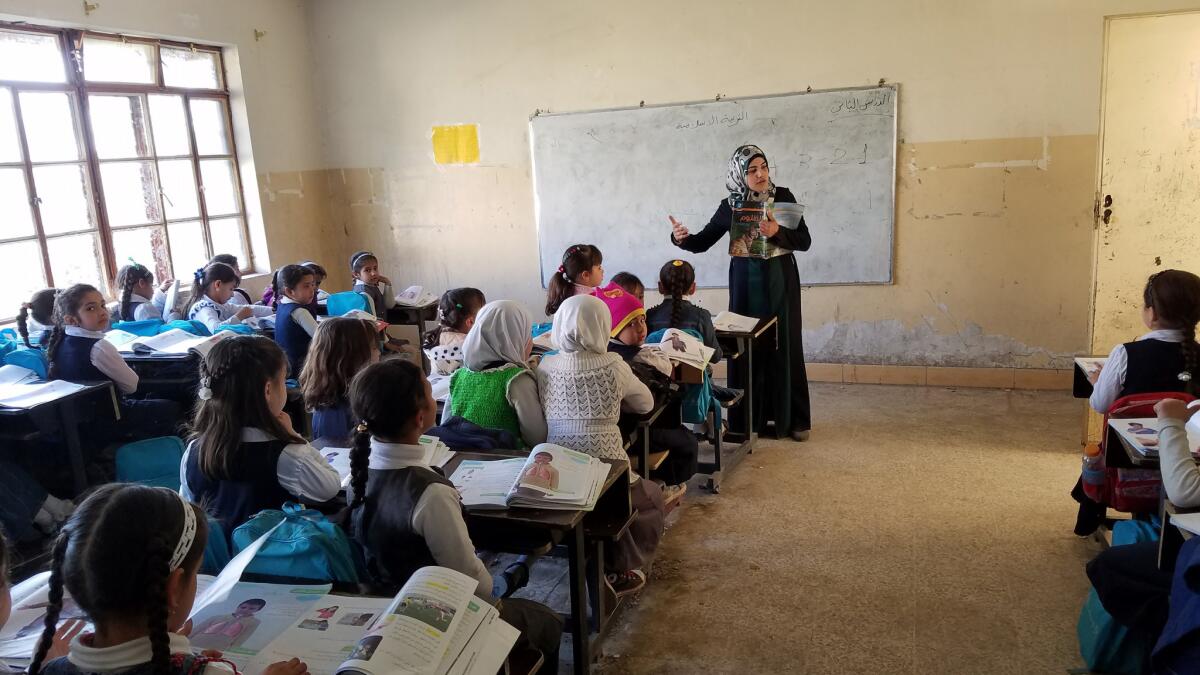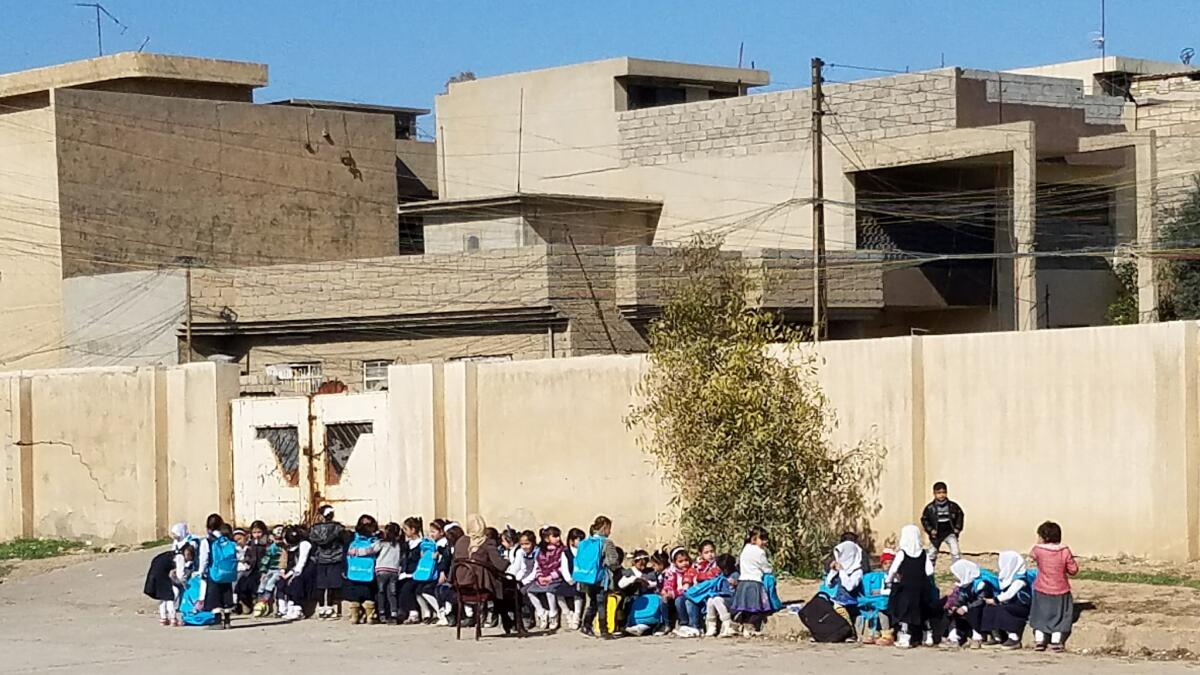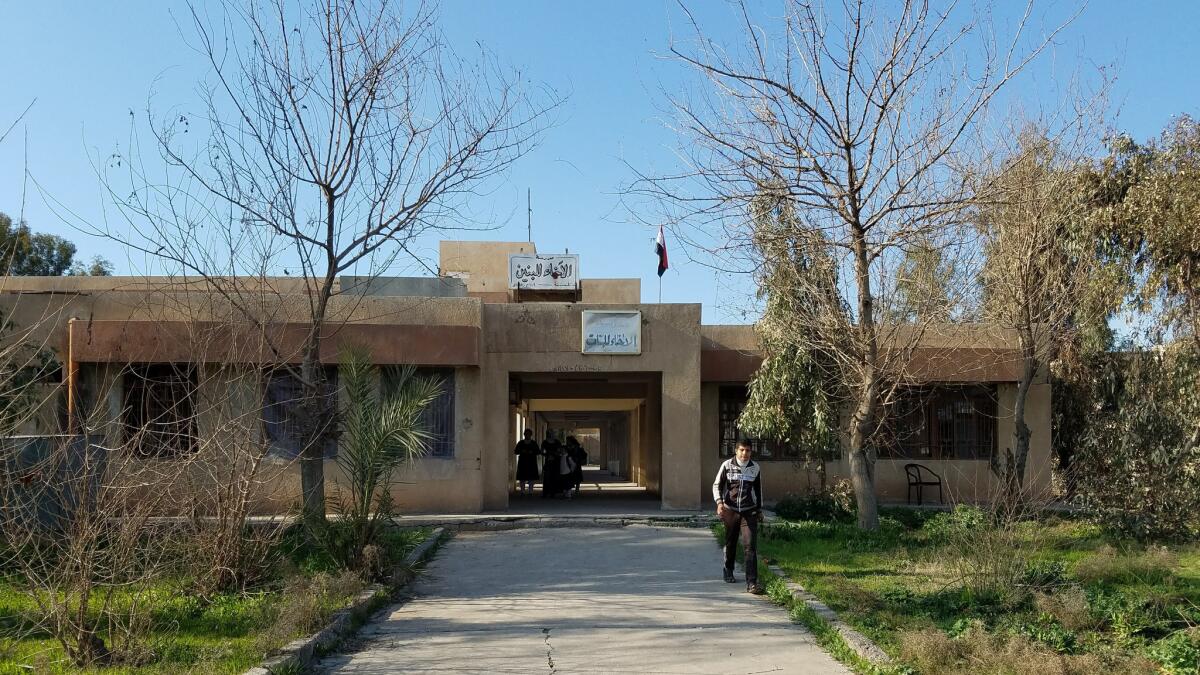The teachers are unpaid and danger is ever present, but Mosul’s schools are reopening

- Share via
Reporting from MOSUL, Iraq — Maysoon Maher knew it was a good day when she saw scores of little girls run, giggling, through the courtyard of her school on Mosul’s east side.
Rarely are her students, ages 6 to 15, allowed outside, Maher said as she crossed the dusty courtyard Monday toward several classrooms.
Schools and businesses have reopened since Islamic State was driven out of east Mosul in January, but with the militants still entrenched on the west side of the city, the area’s future remains uncertain.
At Maher’s school, teachers usually keep their 1,150 pupils inside the beige concrete compound to avoid Islamic State drones armed with bombs. Weaponized drones still threaten the neighborhood the school is named after — Al Akhaa, which means Brotherhood — months after it was supposedly freed from the militants.
Maher, who is deputy director of the school, has been teaching for 30 years. She was working here when Islamic State seized control, stopped paying teachers their $800 monthly salaries and forced them to stay. She had to wear a black, floor-length gown, known as an abaya, with a full face veil and teach the jihadis’ curriculum.
“They changed all the courses and were teaching them bad things [with] math: A bomb plus a bomb. They were trying to brainwash them,” Maher said as she sat in her office, wearing a brown head scarf and matching velvety coat with rhinestone buckles.

Many parents stopped sending their children to school. Maher watched packed classes dwindle to just 15 students. Of the students remaining, few were girls and almost all were the children of militants, including some Russians.
The school had to close temporarily in October, when the U.S.-backed coalition launched an offensive to recapture the city. Al Akhaa reopened Jan. 22 after the east side was declared free of Islamic State.
Maher sent her 11-year-old daughter, Omaima Ahmed, back to school, but could offer few other reassurances to fellow parents. The compound had no water, electricity or security. Soldiers were still fighting nearby. Even after the front line shifted west, suicide bombers were still targeting gathering places on the east side, such as markets, restaurants and schools.
I wanted to learn, but what they taught us was so bad.
— Sidrah Taleh, 11
Last week, there were reports of chemical weapons attacks in a nearby neighborhood. Booms from artillery could be heard from inside Al Akhaa this week.
“We told them it’s risky,” Maher said. “Still, they come.”
Ayman Moayed, a barber, came to the school Monday to register his 8-year-old daughter Janat, who lingered by his side, swishing her red dress and bobbed hair.
“She’s supposed to be in third grade, but because she didn’t go to school for two years, she’s in first,” Maher said.
About 600 boys attend the school in the mornings, 550 girls in the afternoon, Maher said. They come from all across the city, including some who fled the embattled west side this week.
Maher pushed open the metal door of a second-grade science class. The room was packed with 60 girls, some in uniform, some not. Many parents, like the barber, are too poor to initially afford the simple white blouse and blue jumper, Maher said. Half a dozen wore head scarves, uncommon among such young girls. When the school reopened, some families sent girls wearing abayas and face veils.
“Families were concerned Islamic State might return,” she said.
Maher resisted.
“I told them not to wear it again,” she said. “Inside the school we don’t have any men. There was no reason to wear it.”
The girls had biology workbooks open on their wooden desks.
“The heart is the most important part of the body,” teacher Rashan Shokr said. “Where’s your heart?”
The students placed their hands over their hearts and shouted “left side!” — a common nickname for the east side of Mosul.
Many of them were 7 years old, but some were older, having missed school under Islamic State.
“Why didn’t you come under Daesh?” Maher asked, using the Arabic term for Islamic State.
“In their books, it was bomb plus bomb!” a girl with braids shouted from the back of the classroom.
“It was an injustice,” said another girl, in a uniform and white head scarf.

Before the school reopened, Maher and the 54 other teachers had to submit to screening by the Iraqi Education Ministry, which checked their names and backgrounds against lists it maintains of Islamic State members. Some teachers at other schools failed and were not allowed back, but all of the staff members at Al Akhaa were cleared, Maher said. They remain unpaid.
Maher’s husband lost his job at a local oil company when Islamic State seized the city, and they have had to sell her gold wedding jewelry to make ends meet for their family of six.
On Thursday, Maher and other teachers plan to go on strike to demand salaries and back pay. It will be a quiet protest: The teachers still feel so unsafe in the streets, she said, they will instead stage a work stoppage inside the school. She doubts Iraqi officials will help them.
“We don’t have hope,” she said, but other than the daylong strike, “we will keep working to give children an advantage.”
They still have no utilities or security. Maher wishes they at least had a security guard at the front gate to check those entering. Teachers try to check bags, she said, but they don’t know what to look for. Last week, she noted, a Russian woman was caught trying to detonate an explosives belt among parents at another east Mosul school for girls.
“After the liberation, we felt safe. But after the attacks recently, we are afraid for our kids and their security,” said Maher’s assistant, Nadia Aziz.

Iraqi forces advancing into west Mosul discovered a train tunnel that had been converted by ISIS militants into a training facility, complete with obstacle course, sleeping quarters and medical station. We toured the site with a member of Iraq’s eme
Maher moved on to other classes, all packed with girls toting Dora the Explorer coloring books, Sofia the First pencil cases and blue backpacks from UNICEF, the only donations the school has received.
In a fifth-grade class, Maher pointed out a uniformed student in a white cotton head scarf who survived schooling by Islamic State.
“I wanted to learn, but what they taught us was so bad,” 11-year-old Sidrah Taleh said, repeating the now familiar refrain: “bomb plus bomb, bullet plus bullet.”
Sidrah complained to her mother, who told her to stick it out.
“She told me, ‘Don’t learn anything they’re teaching you, only to read and write,’” Sidrah said.
Sidrah’s family were not affiliated with Islamic State, school officials said, and they think the girl was unfazed by the brainwashing.
“We can tell she wasn’t affected,” Maher said.
Sidrah agreed, but the full effect may not be clear until she’s older. When she grows up, she plans to be a teacher — of Islam.
“To tell people there’s only one god who is God and to be good to people, not like Daesh, who are disbelievers,” she said with a shy smile as the school day ended.
Some girls lingered in the hallways, afraid of encountering drones on their walk home. Maher let them stay.
Others filed out through the schoolyard choked with weeds, out the battered metal front gate, past bullet-riddled houses and the corner mosque, a line of braids, blue jumpers and backpacks picking their way through destruction, hand in hand.
Twitter: @mollyhf
ALSO
Born under a bad sign: Mosul residents with Islamic State birth certificates need a do-over
UAE’s minister of happiness insists her job is no laughing matter
The day of Trump toilets and condoms in China may have just ended. Here’s why that’s controversial
More to Read
Sign up for Essential California
The most important California stories and recommendations in your inbox every morning.
You may occasionally receive promotional content from the Los Angeles Times.










